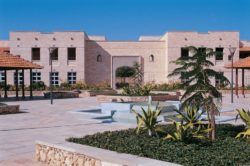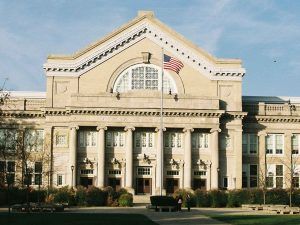Eight Kenyan students in the Educating Girls in Science (EGIS) Project of the Aga Khan Academy, Mombasa (AKA,M), supported by the Intel Foundation and the Aga Khan Foundation, took part in an exchange with students at Nicholas Senn High School in Chicago. That included a photography workshop described in an earlier blog post and an exchange between the Mombasa students and the students at Senn. That exchange explored truth in storytelling and the injustices of media-driven stereotypes. The Kenyan students improved their communication skills and confidence and gained training in computer skills. For the Chicago students, the exchanged opened up unexpected interests, as shared by Senn teacher Todd Gross.
The Skype Exchange

The Aga Khan Academy in Mombasa, Kenya
In Skype sessions, my students in the Theory of Knowledge class and the students in Kenya together addressed the existence of stereotypes through questions about each other. The exchanges that surprised me came early when the students were deciding the themes they wanted to explore for the project. They did not come up with themes that I would have come up with when I wanted to learn about Africa, but they were all in agreement: they wanted to see each others’ campuses, they wanted to see each others’ food, and they were very interested in sports. These were things they wanted to learn about teenagers on the other side of the planet.
They were naturally curious about how their lives looked compared with these other kids. They were not looking for differences as much as similarities. One point of the exchange was to dispel stereotypes, but it grew into finding commonalities and marveling at small differences. This came out of the realization that the biggest differences never turned out to be accurate. It morphed into a social media experience for which they were well equipped.
The most striking moment of the project centered on a large poster of ideas about Africa that we generated here at Senn. During our first Skype session, they pulled out the poster and put it up in front of the students there in Mombasa. The students here were instantly embarrassed by the ideas that they could immediately see were ridiculous stereotypes. On the screen, they saw kids in very modern classrooms who talked and acted just like them. A flurry of apologies came out. I can’t imagine a more powerful way to dispel stereotypes than to have your own unmasked in such a public way.

Nicholas Senn High School in Chicago, Illinois
For me as a teacher, what followed was even better. The kids started to ask, “Why do we have these ideas? Where did they come from?” This led to a great discussion with the Kenyan students and we followed up in our classroom discussion.
From there, they shared pictures of home, and school, community, and food, sports and holidays. All of these have been filling the gaping holes revealed by that first moment when they realized that all of their previous ideas about Africa were based on extremely unreliable sources.
Theory of Knowledge is a course we offer in metacognition. We want students to explore how they form ideas, beliefs and understandings. More importantly, we want them to question how they developed those things in the first place. What was great about the Mombasa experience was that they first realized they had ideas that were completely unrelated to reality. Second, they immediately asked where those ideas came from. The discussions that followed were enlightening, but the fact that the students basically guided the project toward these meta-cognitive questions fulfilled one of the major goals of the course, which is to get students to engage actively with their world.
Reflecting on the Exchange
The other thing that surprised me and the students was that the first day we Skyped, it was -3 degrees F in Chicago and 97 degrees in Mombasa (that’s a 100-degree difference). We were shivering at 7 a.m. and the Mombasa students were tired and sweaty at 4 p.m. their time. The size of the planet and its real-world implications surprised us all.
A happy side effect was that it sparked the interest in travel in my students. They want to go and see Africa for themselves. They realize how different the world is from the original ideas and that it is not scary and indeed fascinating. I told them many times that travel is the best learning experience. I’m sure I sounded like Charlie Brown’s teacher. The connection with kids like them in a class like theirs on the other side of the planet did more to open their minds than my words ever could.